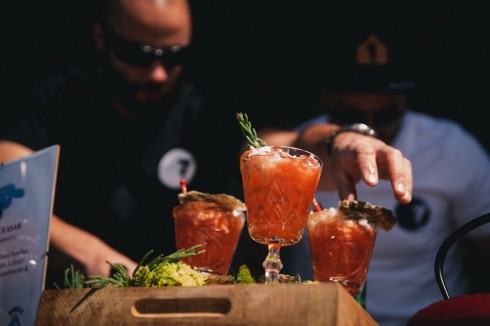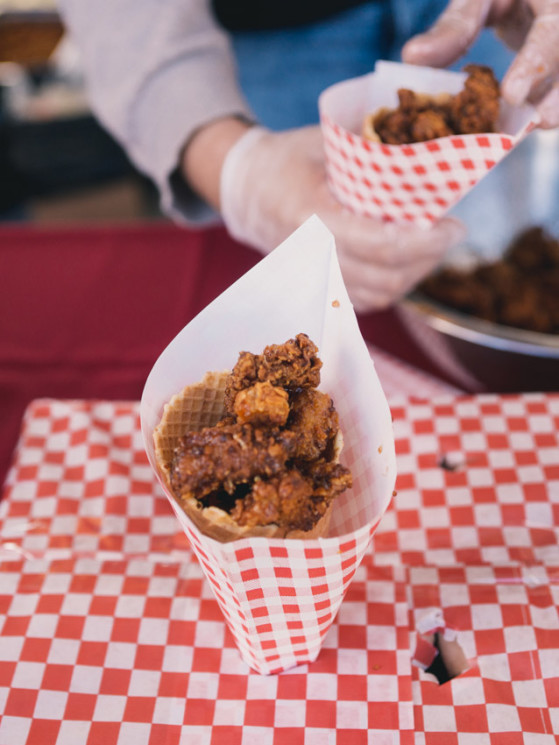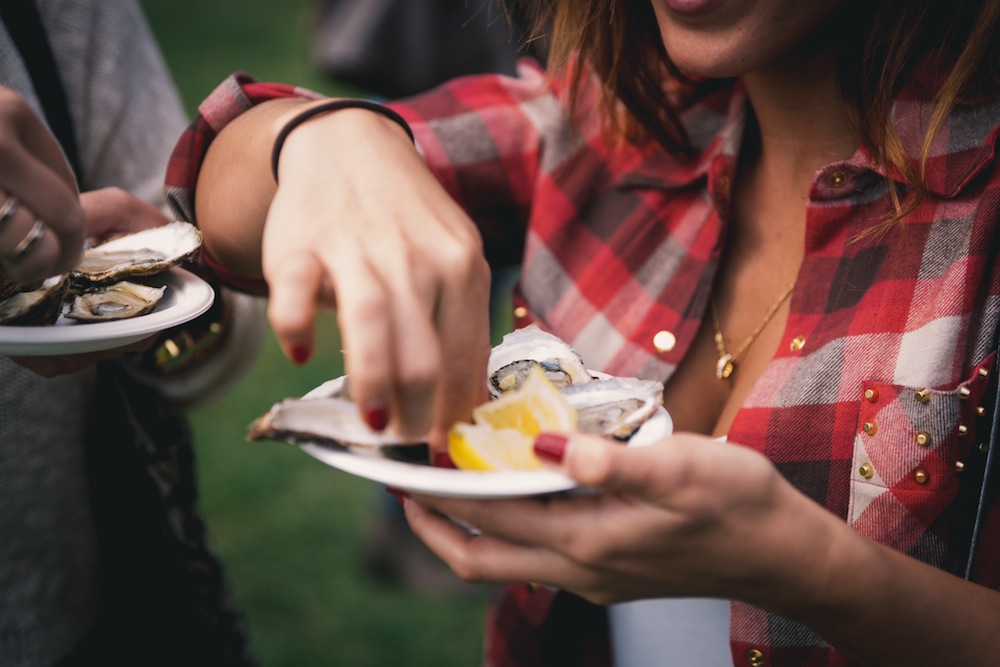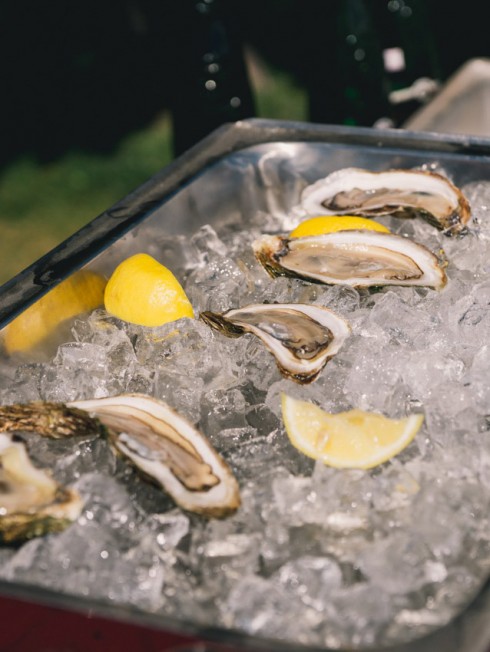
Oysterfest
A Small Business Marketing Dream

Okay so who didn’t black out at Oysterfest?! I’m kidding. Or am I? Either way, I think anyone who attended the Montreal Oysterfest can strongly confirm that founder Daniel Notkin sure knows how to put on one hell of a charity event. The beneficiary of the event was the World Wildlife Fund of Canada. More specifically, 100% of the funds raised were donated to aid in advancing their sustainable seafood program. With over 23,000 oysters on site, a wide variety of food vendors, one “not-so-kosher-but-oh-so-exciting” Mott’s Clamato Caesar competition and a crowd so beautiful that selfies trumped food shots on Instagram, it’s not hard to understand why we were in attendance. Maybe it was the lure of the oyster shucking competition or the Korean-inspired tacos from Flyjin or the lobster rolls from … wait who was it again?
The day was that perfect fall anomaly: chilly in the shade with the sun coming out strong enough to make my baseball cap and oversized tinted frames just passably appropriate. The crowd, filled with familiar faces, buzzed with the energy that only comes from giving back — or maybe it was the Mezcal Tequila expertly mixed into darling pink concoctions by Matt McKean. For the afternoon the Terrasses Bonsecours Island was our playground, but what I quickly noticed was that sexy singles weren’t the only ones taking names and giving out digits.

 “Not a lot of people do sweets at Oysterfest. I don’t think there was anything else there so it’s always a good push for us,” Josie Weitzenbauer told me over a post-Oysterfest recovery doughnut at her Saint-Henri shop, Léché Desserts. And she’s right. On the sweet side there was only one place to go and that was to visit Josie and her team of “pink ladies” at their shop’s food stall. “My main goal is to get out there and promote the business. Make people aware. If I can get a couple of clients out of it… that’s a bonus. An ongoing client or a wholesale client, that’s even better.”
“Not a lot of people do sweets at Oysterfest. I don’t think there was anything else there so it’s always a good push for us,” Josie Weitzenbauer told me over a post-Oysterfest recovery doughnut at her Saint-Henri shop, Léché Desserts. And she’s right. On the sweet side there was only one place to go and that was to visit Josie and her team of “pink ladies” at their shop’s food stall. “My main goal is to get out there and promote the business. Make people aware. If I can get a couple of clients out of it… that’s a bonus. An ongoing client or a wholesale client, that’s even better.”
Josie is only one of the many smaller start-up companies that have seen the proverbial light at the end of the new wave marketing tunnel. Charity and food festival events are definitely a gold mine for potential clients, media coverage and brand exposure; the holy trifecta of public relations. Oysterfest is an opportunity to access all three and all in a day’s work with minimal costs. Josie leans onto her shop’s wooden snackbar and continues, “To have that many people in one place and be able to meet and talk to them, it develops that personal association which is super important for us. It makes a big difference. I mean it could take me a month here to get that kind of traffic, you know? So having that in one day, it’s worth it.” Point taken.
“It’s not really a risk. You know what you’re getting out of it. If I get one client from it, I pretty much get my money back,” Raegan Steinberg Cohen explains to me over the phone. “It’s essentially free marketing for us.” She and her husband, Alex Cohen, along with their partner Anthony Nassif, have formed Back of House Catering, a high-end catering business that’s just barely seven months old. ”We’re a young team so without being able to see and taste our food people would probably never know to hire us. Coming to events like Oysterfest gives us the chance to put our food in people’s hands and to let them see that we are professionals and that’s huge. That’s the most important thing we can do.”
Even more important for these start-ups is “letting the industry people know that we exist,” Raegan stresses. Similarly Josie had mentioned to me, “Oysterfest is a good time for me to meet other restaurateurs and chefs. Where I can tell them about our products and what we can do for them. I actually got a new contract that day.” Moving up the food industry’s ladder clearly starts with forming a strong base. A presence. The motto of “we are here, hear us roar” seems to be plastered on each one of these young entrepreneurs’ walls.
I later spoke to Matt Mckean from El Tinieblo Mezcal and he put it matter-of-factly: “We have a unique product. If people don’t know me or Geoffrey Moreau (his business partner) they’re not going to order it at a restaurant or bar. It takes a platform like Oysterfest to create that kind of networking opportunities for us.
To have people understand and truly respect the quality of our product.” As we speak over the phone I can hear ice clink in his glass of what I assume is Mezcal. “We picked fresh cranberries this morning,” he explains to me, “so it’s a cranberry-tequila kind of day,” he confirms. He quickly follows up, “Hey, I’m on vacation.” It’s got to be five o’clock somewhere, right?
Matt is no stranger to charity work. “Most of our marketing is done through charities,” he laughs. “They are a great place for us to share our enterprise. Without being pretentious, at these types of events people give you the time of day and it’s less formal. Basically, it’s not a business meeting at Place Ville Marie. We produce a handmade product that is focused on quality. People need to know that.” Matt is well known for creating thoughtful and unprecedented cocktails usually involving some labour-intensive process, which he will pump out over and over at each of these charity events, all with his signature smile.

The rise of social media and the growth of internet crazed audiences has provided small companies with the ability to take an unconventional approach to marketing. Guerrilla marketing isn’t a novel concept but the methods being practiced are. Since Jay Conrad Levinson coined the term in 1984, advertising and marketing teams have been concocting unique approaches as alternatives to the oversaturated traditional formats.
Networking charity events, facebook and twitter allow small companies to stand out and advertise on small budgets. In the last five to ten years increasingly easy internet access and the growth of social media have transformed guerilla marketing. The costs are right, the information is instant and the viewers are starved for constant stimulation and all this creates the perfect incubator for building brand awareness.
“It’s amazing to see that now people recognize our brand. They see the pink t-shirts and they’ll come up to us and say ‘we love your shop’. It’s really cool to see the progress. It still blows my mind when people know who we are,” Josie says humbly. It’s that type of humility that small business owners still possess which explains why this type of setting truly breeds great results. Not to mention fostering relationships is always better when done with food or alcohol and even better when said food is a bundle of freshly made doughnuts glazed tableside.
So in the wake of Montreal Oysterfest and in the post summer lull what are these small businesses looking forward to? “Well the boys gave away over 200 business cards and people kept asking where to find us and where we came from,” Raegan laughs. “My whole business has been based on word-of-mouth and in under 10 months we’ve basically built a business from the ground up.” I later asked her where they prepare the food and she explained they make everything out of her own kitchen but are on the lookout for a small space to house the business in the near future. Talk about a Drake-style success story. I highly suggest you keep an eye on Back of House Catering. Matt basically said the same thing, “I saw 2,500 faces and was tweeted over 150 times or something crazy like that.” It’s hard to believe that his company is only six months old and that it’s run simply by two young men.
When the shucking competitions were done, the last Burgundy Lion pint was poured and the last waffle came out of the Back of House Catering hot iron the crowd dispersed. Wrapped up in the excitement of being overfed and slightly tipsy, the festival goers went home probably none the wiser that these small businesses had just hit the marketing jackpot. Charity marketing, at least the food stall version, works. The three entrepreneurs I talked to all came away happy and satisfied that they had met their goals, to let people know who they are and that they are here. When I had asked Matt why it was so important that people at these events get to meet him specifically, he answered: “Because my product, it’s much more than just a spirit … it’s a lifestyle.” And I could almost sense him raising his glass in cheers from the other end of the phone.

Okay so who didn’t black out at Oysterfest?! I’m kidding. Or am I? Either way, I think anyone who attended the Montreal Oysterfest can strongly confirm that founder Daniel Notkin sure knows how to put on one hell of a charity event. The beneficiary of the event was the World Wildlife Fund of Canada. More specifically, 100% of the funds raised were donated to aid in advancing their sustainable seafood program. With over 23,000 oysters on site, a wide variety of food vendors, one “not-so-kosher-but-oh-so-exciting” Mott’s Clamato Caesar competition and a crowd so beautiful that selfies trumped food shots on Instagram, it’s not hard to understand why we were in attendance. Maybe it was the lure of the oyster shucking competition or the Korean-inspired tacos from Flyjin or the lobster rolls from … wait who was it again?
The day was that perfect fall anomaly: chilly in the shade with the sun coming out strong enough to make my baseball cap and oversized tinted frames just passably appropriate. The crowd, filled with familiar faces, buzzed with the energy that only comes from giving back -- or maybe it was the Mezcal Tequila expertly mixed into darling pink concoctions by Matt McKean. For the afternoon the Terrasses Bonsecours Island was our playground, but what I quickly noticed was that sexy singles weren’t the only ones taking names and giving out digits.

 “Not a lot of people do sweets at Oysterfest. I don’t think there was anything else there so it’s always a good push for us,” Josie Weitzenbauer told me over a post-Oysterfest recovery doughnut at her Saint-Henri shop, Léché Desserts. And she’s right. On the sweet side there was only one place to go and that was to visit Josie and her team of “pink ladies” at their shop’s food stall. “My main goal is to get out there and promote the business. Make people aware. If I can get a couple of clients out of it… that’s a bonus. An ongoing client or a wholesale client, that’s even better.”
“Not a lot of people do sweets at Oysterfest. I don’t think there was anything else there so it’s always a good push for us,” Josie Weitzenbauer told me over a post-Oysterfest recovery doughnut at her Saint-Henri shop, Léché Desserts. And she’s right. On the sweet side there was only one place to go and that was to visit Josie and her team of “pink ladies” at their shop’s food stall. “My main goal is to get out there and promote the business. Make people aware. If I can get a couple of clients out of it… that’s a bonus. An ongoing client or a wholesale client, that’s even better.”
Josie is only one of the many smaller start-up companies that have seen the proverbial light at the end of the new wave marketing tunnel. Charity and food festival events are definitely a gold mine for potential clients, media coverage and brand exposure; the holy trifecta of public relations. Oysterfest is an opportunity to access all three and all in a day’s work with minimal costs. Josie leans onto her shop’s wooden snackbar and continues, “To have that many people in one place and be able to meet and talk to them, it develops that personal association which is super important for us. It makes a big difference. I mean it could take me a month here to get that kind of traffic, you know? So having that in one day, it’s worth it.” Point taken.
“It’s not really a risk. You know what you’re getting out of it. If I get one client from it, I pretty much get my money back,” Raegan Steinberg Cohen explains to me over the phone. “It’s essentially free marketing for us.” She and her husband, Alex Cohen, along with their partner Anthony Nassif, have formed Back of House Catering, a high-end catering business that’s just barely seven months old. ”We’re a young team so without being able to see and taste our food people would probably never know to hire us. Coming to events like Oysterfest gives us the chance to put our food in people’s hands and to let them see that we are professionals and that’s huge. That’s the most important thing we can do.”
Even more important for these start-ups is “letting the industry people know that we exist,” Raegan stresses. Similarly Josie had mentioned to me, “Oysterfest is a good time for me to meet other restaurateurs and chefs. Where I can tell them about our products and what we can do for them. I actually got a new contract that day.” Moving up the food industry’s ladder clearly starts with forming a strong base. A presence. The motto of “we are here, hear us roar” seems to be plastered on each one of these young entrepreneurs’ walls.
I later spoke to Matt Mckean from El Tinieblo Mezcal and he put it matter-of-factly: “We have a unique product. If people don’t know me or Geoffrey Moreau (his business partner) they’re not going to order it at a restaurant or bar. It takes a platform like Oysterfest to create that kind of networking opportunities for us.
To have people understand and truly respect the quality of our product.” As we speak over the phone I can hear ice clink in his glass of what I assume is Mezcal. “We picked fresh cranberries this morning,” he explains to me, “so it’s a cranberry-tequila kind of day,” he confirms. He quickly follows up, “Hey, I’m on vacation.” It’s got to be five o’clock somewhere, right?
Matt is no stranger to charity work. “Most of our marketing is done through charities,” he laughs. “They are a great place for us to share our enterprise. Without being pretentious, at these types of events people give you the time of day and it’s less formal. Basically, it’s not a business meeting at Place Ville Marie. We produce a handmade product that is focused on quality. People need to know that.” Matt is well known for creating thoughtful and unprecedented cocktails usually involving some labour-intensive process, which he will pump out over and over at each of these charity events, all with his signature smile.

The rise of social media and the growth of internet crazed audiences has provided small companies with the ability to take an unconventional approach to marketing. Guerrilla marketing isn’t a novel concept but the methods being practiced are. Since Jay Conrad Levinson coined the term in 1984, advertising and marketing teams have been concocting unique approaches as alternatives to the oversaturated traditional formats.
Networking charity events, facebook and twitter allow small companies to stand out and advertise on small budgets. In the last five to ten years increasingly easy internet access and the growth of social media have transformed guerilla marketing. The costs are right, the information is instant and the viewers are starved for constant stimulation and all this creates the perfect incubator for building brand awareness.
“It’s amazing to see that now people recognize our brand. They see the pink t-shirts and they’ll come up to us and say ‘we love your shop’. It’s really cool to see the progress. It still blows my mind when people know who we are,” Josie says humbly. It’s that type of humility that small business owners still possess which explains why this type of setting truly breeds great results. Not to mention fostering relationships is always better when done with food or alcohol and even better when said food is a bundle of freshly made doughnuts glazed tableside.
So in the wake of Montreal Oysterfest and in the post summer lull what are these small businesses looking forward to? “Well the boys gave away over 200 business cards and people kept asking where to find us and where we came from,” Raegan laughs. “My whole business has been based on word-of-mouth and in under 10 months we’ve basically built a business from the ground up.” I later asked her where they prepare the food and she explained they make everything out of her own kitchen but are on the lookout for a small space to house the business in the near future. Talk about a Drake-style success story. I highly suggest you keep an eye on Back of House Catering. Matt basically said the same thing, “I saw 2,500 faces and was tweeted over 150 times or something crazy like that.” It’s hard to believe that his company is only six months old and that it’s run simply by two young men.
When the shucking competitions were done, the last Burgundy Lion pint was poured and the last waffle came out of the Back of House Catering hot iron the crowd dispersed. Wrapped up in the excitement of being overfed and slightly tipsy, the festival goers went home probably none the wiser that these small businesses had just hit the marketing jackpot. Charity marketing, at least the food stall version, works. The three entrepreneurs I talked to all came away happy and satisfied that they had met their goals, to let people know who they are and that they are here. When I had asked Matt why it was so important that people at these events get to meet him specifically, he answered: “Because my product, it’s much more than just a spirit … it’s a lifestyle.” And I could almost sense him raising his glass in cheers from the other end of the phone.
